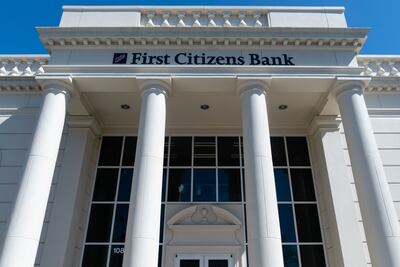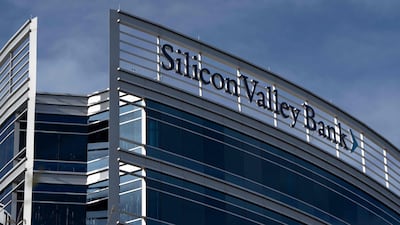First Citizens Bank & Trust will acquire Silicon Valley Bank, which collapsed earlier this month, the Federal Deposit Insurance Corporation (FDIC) confirmed on Monday.
First Citizens has entered into a purchase and assumption agreement for all deposits and loans of SVB, the FDIC said in a statement.
The 17 former branches of SVB will open as First Citizens Bank & Trust on Monday.
SVB was the 16th largest bank in the US with about $209 billion in total assets before its collapse.
As of March 10, SVB had approximately $167 billion in total assets and about $119 billion in total deposits.
The FDIC had created a bridge bank to hold the deposits and assets of SVB's former clients, a majority of which have deposits that are up to millions of dollars above the $250,000 threshold the FDIC insures.
As part of the transaction, First Citizens will purchase about $72 billion of SVB's assets at a discount of $16.5 billion, the FDIC said.
Approximately $90 billion in securities and other assets will remain in the receivership for disposition by the FDIC.
The FDIC also received equity appreciation rights in First Citizens' common stock with a potential value of up to $500 million.
Depositors of SVB will automatically become depositors of First Citizens Bank and the deposits will continue to be insured by the FDIC up to the insurance limit.

"We have partnered with the FDIC to successfully complete more FDIC-assisted transactions since 2009 than any other bank, and we appreciate the confidence the FDIC has placed in us once again," said Frank Holding Jr, chairman and chief executive of First Citizens.
"We look forward to building relationships with our new customers and positioning our company for continued success as we affirm our commitment to support the integrity of our nation's banking system."
As per the transaction, the FDIC as receiver and First Citizens "will share in the losses and potential recoveries on the loans covered by the loss–share agreement", the statement said.
"The loss–share transaction is projected to maximise recoveries on the assets by keeping them in the private sector. The transaction is also expected to minimise disruptions for loan customers."
The FDIC estimates the cost of the failure of SVB to its Deposit Insurance Fund to be approximately $20 billion.
The exact cost will be determined when the FDIC terminates the receivership.
California-based SVB, which started in 1983, rode the wave of America's local high-technology economy during that decade and rose further during the dotcom era of the 1990s, when tech start-ups started growing.
Its status as the go-to bank for technology entrepreneurs and start-ups continued until its final years.
It became the biggest bank failure in US history after Washington Mutual's collapse in 2008, which, in turn, triggered the global financial crisis.
While SVB's crash triggered broader concerns about the health of the US banking sector, Goldman Sachs said last week “a repeat of the turmoil [of] 15 years ago seems unlikely”.
Even though the collapse is significant, it is “a very idiosyncratic situation”, said Richard Ramsden from the investment bank's research team.
“You had a bank that had taken a lot of interest rate or duration risk on their portfolio — coupled with the fact that they had a very concentrated deposit base that was very exposed, obviously, to the venture capital community and venture capital portfolio companies that were experiencing these very significant outflows,” Mr Ramsden said in a podcast called Exchanges at Goldman Sachs.


